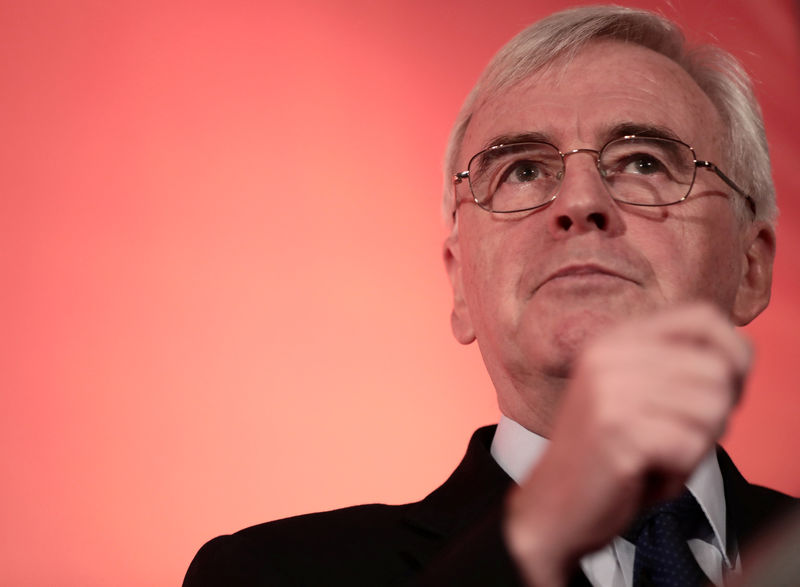By Andrew MacAskill and Andy Bruce
LONDON (Reuters) - Britain's opposition Labour Party could ask the Bank of England to target productivity to help boost the economy if it wins power, in the most radical change to the central bank's remit in more than two decades.
Consultants commissioned by John McDonnell, the shadow chancellor, recommended the bank should retain its independence, but that its mandate be expanded to include an annual productivity growth target of 3 percent.
Currently the bank's main economic focus is keeping inflation as close to 2 percent as possible.
McDonnell said in a speech Wednesday that commercial banks had distorted the UK economy and this has resulted in Britain having the lowest rate of investment among the world's seven largest major advanced economies.
"It has been a scandal the lack of ambition that has been shown in recent years around that investment.... We are falling behind our competitors, but as a result of that reducing the standards of living for our population," McDonnell said.
We "want to build the economy of the future, and to do that we will need to reform the economic architecture of our country so that it is prepared to meet the challenges of this century."
Although Labour trails the Conservative Party in most opinion polls, it is considered a viable future government given that Prime Minister Theresa May is undertaking a complex and divisive exit from the European Union without a parliamentary majority.
The proposed changes to the BoE's remit are the most significant since it gained independence from the government in 1997 in one of Tony Blair's first acts as prime minister, a decision widely seen as underpinning Britain's economic success over the following decade.
Weak growth in productivity – the amount of economic output produced per hour worked - is one of Britain's biggest economic problems, and one that has puzzled economists.
Productivity growth has been poor in most advanced economies since the 2008 financial crisis, but it has been particularly weak in Britain, growing by less than 2 percent in total over the past decade and acting as a major drag on wages.
Bank of England policymakers have in the past tended to stress the adoption of new technology, company managements and migration as the main determinants of productivity growth – none of which they have any control over.
The Bank of England declined to comment on Labour's plan.
Other major central banks already explicitly target measures other than inflation. The U.S. Federal Reserve and Reserve Bank of Australia both have a responsibility to focus on increasing employment as well as price stability.
The other findings from the consultants' review include moving the Bank of England's domestic functions, including the central bank interest-rate setting committee to Birmingham.
McDonnell joked that he recently met with Bank of England Governor Mark Carney and promised to help him find a flat in the city.
Last year, Labour said it would consider moving parts of the Bank of England to Birmingham, in central England, if it won power, arguing a change was needed to reduce the economy's reliance on London and its financial services industry.

The report also recommends using Royal Bank of Scotland (L:RBS), majority owned by the state, to deliver more loans to small companies.